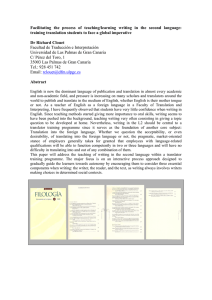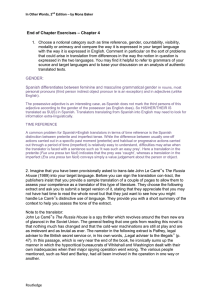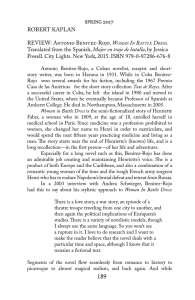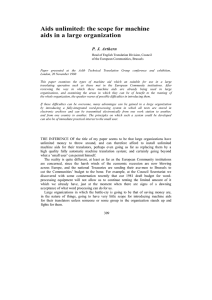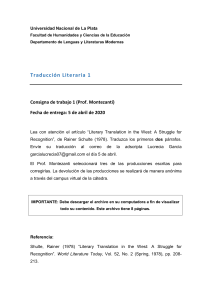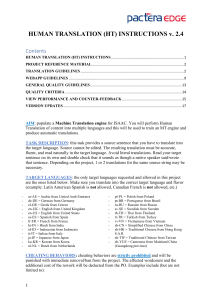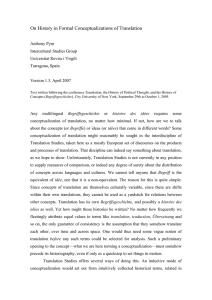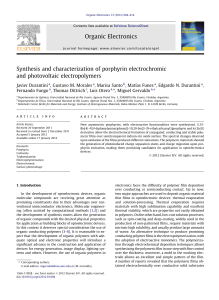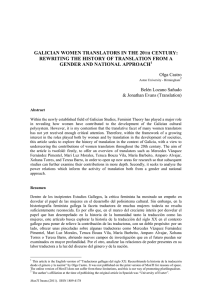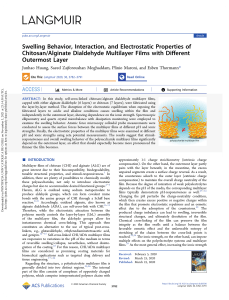English speakers have long Humor and Translation Mark Herman
Anuncio
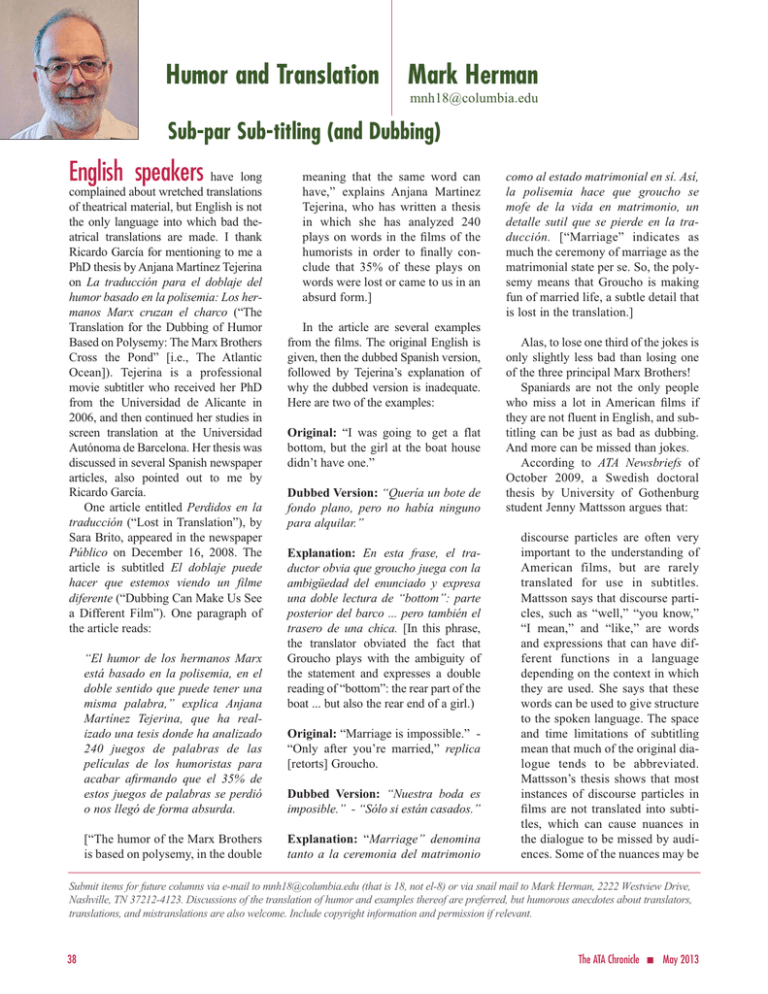
Humor and Translation Mark Herman mnh18@columbia.edu Sub-par Sub-titling (and Dubbing) English speakers have long complained about wretched translations of theatrical material, but English is not the only language into which bad theatrical translations are made. I thank Ricardo García for mentioning to me a PhD thesis by Anjana Martínez Tejerina on La traducción para el doblaje del humor basado en la polisemia: Los hermanos Marx cruzan el charco (“The Translation for the Dubbing of Humor Based on Polysemy: The Marx Brothers Cross the Pond” [i.e., The Atlantic Ocean]). Tejerina is a professional movie subtitler who received her PhD from the Universidad de Alicante in 2006, and then continued her studies in screen translation at the Universidad Autónoma de Barcelona. Her thesis was discussed in several Spanish newspaper articles, also pointed out to me by Ricardo García. One article entitled Perdidos en la traducción (“Lost in Translation”), by Sara Brito, appeared in the newspaper Público on December 16, 2008. The article is subtitled El doblaje puede hacer que estemos viendo un filme diferente (“Dubbing Can Make Us See a Different Film”). One paragraph of the article reads: “El humor de los hermanos Marx está basado en la polisemia, en el doble sentido que puede tener una misma palabra,” explica Anjana Martínez Tejerina, que ha realizado una tesis donde ha analizado 240 juegos de palabras de las películas de los humoristas para acabar afirmando que el 35% de estos juegos de palabras se perdió o nos llegó de forma absurda. [“The humor of the Marx Brothers is based on polysemy, in the double meaning that the same word can have,” explains Anjana Martinez Tejerina, who has written a thesis in which she has analyzed 240 plays on words in the films of the humorists in order to finally conclude that 35% of these plays on words were lost or came to us in an absurd form.] In the article are several examples from the films. The original English is given, then the dubbed Spanish version, followed by Tejerina’s explanation of why the dubbed version is inadequate. Here are two of the examples: Original: “I was going to get a flat bottom, but the girl at the boat house didn’t have one.” Dubbed Version: “Quería un bote de fondo plano, pero no había ninguno para alquilar.” Explanation: En esta frase, el traductor obvia que groucho juega con la ambigüedad del enunciado y expresa una doble lectura de “bottom”: parte posterior del barco ... pero también el trasero de una chica. [In this phrase, the translator obviated the fact that Groucho plays with the ambiguity of the statement and expresses a double reading of “bottom”: the rear part of the boat ... but also the rear end of a girl.) Original: “Marriage is impossible.” “Only after you’re married,” replica [retorts] Groucho. Dubbed Version: “Nuestra boda es imposible.” - “Sólo si están casados.” Explanation: “Marriage” denomina tanto a la ceremonia del matrimonio como al estado matrimonial en sí. Así, la polisemia hace que groucho se mofe de la vida en matrimonio, un detalle sutil que se pierde en la traducción. [“Marriage” indicates as much the ceremony of marriage as the matrimonial state per se. So, the polysemy means that Groucho is making fun of married life, a subtle detail that is lost in the translation.] Alas, to lose one third of the jokes is only slightly less bad than losing one of the three principal Marx Brothers! Spaniards are not the only people who miss a lot in American films if they are not fluent in English, and subtitling can be just as bad as dubbing. And more can be missed than jokes. According to ATA Newsbriefs of October 2009, a Swedish doctoral thesis by University of Gothenburg student Jenny Mattsson argues that: discourse particles are often very important to the understanding of American films, but are rarely translated for use in subtitles. Mattsson says that discourse particles, such as “well,” “you know,” “I mean,” and “like,” are words and expressions that can have different functions in a language depending on the context in which they are used. She says that these words can be used to give structure to the spoken language. The space and time limitations of subtitling mean that much of the original dialogue tends to be abbreviated. Mattsson’s thesis shows that most instances of discourse particles in films are not translated into subtitles, which can cause nuances in the dialogue to be missed by audiences. Some of the nuances may be Submit items for future columns via e-mail to mnh18@columbia.edu (that is 18, not el-8) or via snail mail to Mark Herman, 2222 Westview Drive, Nashville, TN 37212-4123. Discussions of the translation of humor and examples thereof are preferred, but humorous anecdotes about translators, translations, and mistranslations are also welcome. Include copyright information and permission if relevant. 38 The ATA Chronicle n May 2013 particularly important to the audience’s understanding and opinion of characters and events in films. The thesis shows that creative solutions can be used to translate discourse particles, and that English and Swedish can be used to express the same functions, but in different ways. Mattsson says even the most difficult-to-define words and expressions in English have Swedish equivalents. More recently, ATA Newsbriefs of July 2012 ran excerpts from “More Than Words: How Some Movies Wind Up With Lousy Subtitles,” by David Wagner, posted by National Public Radio Online (Washington, DC) on June 28, 2012. In the online article, Wagner states: When Alice’s flamingo-cumcroquet mallet was translated as a “flamenco,” I’d had enough. Everybody makes mistakes, but whoever was responsible for the error-ridden subtitles nearly ruined my viewing of Alice, Jan Švankmajer’s otherwise delightful adaptation of Lewis Carroll’s Alice’s Adventures in Wonderland. The principal reason for bad subtitling, according to Wagner, is the same one that people in all branches of translation complain about. “You get what you pay for,” and many film producers are simply not willing to pay for good translations, or allot the time required to produce a good translation, or even to allow for the most elementary proofreading that would catch obvious “typos, punctuation gaffes, and head-scratching translation choices.” Thus, an otherwise good film can be utterly ruined. Beyond the considerations of money and time, some film producers’ choices are just senseless. For reasons I still don’t fully understand, home video companies often commission new subtitles for DVD releases, paying for rushed, cut-rate translations instead of using the perfectly decent ones that already exist from theatrical runs … Even more incomprehensibly, subtitlers aren’t necessarily work- ing with the original dialogue. In worst-case scenarios, they might be creating subtitles from an already-dubbed film. There’s been speculation that this might have been the problem with one widely mocked DVD box set of Akira Kurosawa films. Perhaps, the theory goes, the subtitles are based off Chinese dub tracks rather than the original Japanese lines. And perhaps that explains why, according to one online analysis, what the British Film Institute version subtitles as “I saw an old woman in the forest,” this version subtitles as “I met a monster in the spider bush.” Or how, similarly, “Keep away from me, you stink” becomes “Get away, you are of cropse smell.” And, more times than not, with dubbing and subtitling as with all other translations, the good ones are not praised because they are not noticed. The bad ones bring down the wrath of the public on the entire translation profession. Dictionary Review Continued from p. 35 cations. (I hasten to add that such a guideline is also missing in the Urzì and Tiberii dictionaries.) Specifically, the user of this dictionary should be told not to lean on a certain collocation as if it were the only one possible. For example, if you read that un fumatore (a smoker) is inveterato (hardcore) and think you should always use this collocation, you end up speaking and writing like everyone else. If you think that “up and down” should always be su e giù, you lose the chance to use the stylistic device giù e su. (You would not, however, be original in using this The ATA Chronicle n May 2013 option; Italian writer and poet Carlo Emilio Gadda was fond of using giù e su as an alternative expression to su e giù.) Overall Evaluation In the end, the biggest risk is to speak in stereotypes. This is why consulting references such as the Dizionario Combinatorio frequently is a good starting point, mainly for a foreign speaker. In the long term, however, try to go beyond if you seek to write with an original voice. Roberto Crivello is a freelance English>Italian translator based in Salt Lake City, Utah. An electrical engineer by training and a keen reader of linguistics issues, he has been in the translation business for 20 years, specializing in technical and technical marketing translations. Currently, he is the language chair of ATA’s English>Italian Certification Workgroup. Contact: mail@robertocrivello.com. 39
